________________
186
Bhamaha" deserves glowing tributes for a lucid exposition of this topic of poetic truth in his Kavyalamkara. His treatment of the defects of poetry, Ayuktimat, Asambhava and Asādṛśya10 Desa-kala-kala-loka-nyāya-âgama-virodhi". and Pratijna-hetu-drstanta-hina12 throws light on this topic. He condemns the poets who attribute a role of messenger to inanimate objects and beings naturally devoid of the power of speech such as a cloud, the wind, the moon, a bee or a dove, a ruddy goose, a parrot and the like. He makes an exception, however, that a person maddened by longing may be represented as sending a message that way. In the course of his treatment of the Upama dosas he wisely observes:
13
(i) सर्वे सर्वेण सारूप्यं नास्ति भावस्य कस्यचित् । यथोपपत्ति कृतिभिरुपमासु प्रयुज्यते ॥ II. 43.
(ii) यस्यातिशयवानर्थः कथं सोऽसंभवो मतः ।
इष्ट चातिशया चमुपमोक्षयोर्यथा ॥ II. 50.
Bhamaha denounces the poet's description as faulty when it is spoilt by its unveracity as regards Deia (country, mountain, forest, etc.), Kala (time. day, night, seasons, etc.), Kala (fine arts like music and dancing), Loka (behaviour of plants and beings, the movable and immovable), Nydya (the science of Politics and Practical Life) and Agama (Civil and Religious Law and rules of behaviour). He gives illustrations of each one of these poetical defects. From this treatment of these defects it is very clear that Bhamaha does not grant licence of scientific ignorance or wanton inaccuracy of detail to the poet. He devotes almost the whole of Chapter V to a consideration of the logical errors called Pratijñā-hetu-drganta-hina." If a proposition in a poem is found, on examination, to be vitiated by logical flaw, it has got to be denounced as faulty. For detecting logical errors in others and avoiding them in one's own poetry the knowledge of logic is very essential. Further, a Sastra-Kavi is at liberty to use Pratijna (logical proposition to be proved). Hetu
6. Works on dramaturgy such as Bharata's Natyaśastra which lay down rules for the playwright (and the producer) to enable him to compose a play answering the description 'Avasthānukṛti' are, though important, excluded in this study due to the limits of this paper.
7. Ed. by D. T. Tatacharya, Tiruvadi, 1934.
8. I. 42-44. 9. II, 47-51. 10. 63-64. 11. IV. 29-50 12. V. 1-60
13. This is a clear reference to Kalidasa's Meghadūta. Bhamaha lived after Kalidasa; made an exception in favour of the Meghadūta, Kalidasa's masterpiece, and criticised other Duta-poems, which must have been its servile imitations. To argue the other way as some scholars have already done, does not appear convincing. Many poems of the Duta literature must have been before Bhamaha's mind when he wrote this passage.
14. Chaper V (Kavya-Nyaya-Nirnaya) is indeed unique for its treatment of logical science and of the logic of poetry or poetic truth in the whole range of works on poetics. His treatment of logical science has bearing on his relation to Dignaga and Dharma-Kirti. As this paper concerns itself with poetic truth, Bhamaha's treatment of logic is skipped over here.




